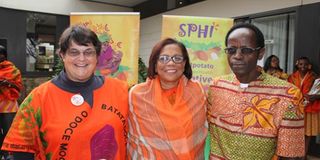Meet the scientist who developed the orange fleshed sweet potato

Left to right, Drs Jan Low, Maria Andrade with Dr Mwanga. In 2016, the team, together with Dr. Howarth Bouis (not in picture) were honoured with the prestigious World Food Prize for their work on orange fleshed sweet potato. COURTESY PHOTO
What you need to know:
With orange fleshed as part of their diet, it is envisaged that there will be fewer malnourished children and anaemic pregnant women. As part of the team behind this innovation, Dr Rober Mwanga shared an international award. He told Beatrice Nakibuuka his story.
Dr Robert Mwanga is one of the brains behind the vitamin-enriched orange fleshed sweet potatoes, which are being promoted as a solution to vitamin A deficiency.
It was fulfilling because fewer children and pregnant women would suffer from the condition. According to him, the statistics do not bring out a clear picture of the magnitude of the problem.
“In Uganda, the prevalence is said to be at 33 per cent which translates into 51 children dying every day due to vitamin A deficiency,” he points out. The vitamin helps in strengthening the immune system and eye sight. The orange in the sweet potato shows the presence of beta-carotene which the body converts into vitamin A.
Starting the idea
In 1978, when he graduated with a Bachelor of Science degree from Makerere University, he started the preliminary breeding work at the then Kawanda Research Station.
He narrates thus: “I went for training in 1983 at the International Institute for Tropical Agriculture.
I completed my MSc and returned to Uganda in 1986 but there were no funds to do research at the Namulonge Station so I went for fellowships and trainings. In 1995, I got a winning proposal funded by McKnight Foundation, and was renewed four times over a period of 15 years.
It was during the McKnight Foundation support that I did my PhD at North Carolina State University in US (1996 to 2001). I did my research work at Namulonge in Uganda and at CIP, Lima in Peru.”
It was Dr Howarth Bouis of HarvestPlus who came up with the idea to use staple foods to provide micro-nutrients that would solve problems of malnutrition in African countries so I thought about sweet potatoes.”
He used conventional breeding to produce new orange fleshed sweetpotato varieties that are preferred by farmers and consumers, and adapted to the growing conditions in Uganda.
When he got back to Uganda in 2001, Makerere Medical School, International Potato Centre and the National Agricultural Research Organisation (Naro) were promoting orange fleshed sweet potato in Luweero in a Usaid-pilot project.
“I evaluated the potential varieties, and officially released two varieties Kakamega and Ejumula which were promoted in the area,” says Dr Mwanga. “I have bred a total of 22 sweet potato breeds in Uganda and six in Rwanda.”
Orange potatoes are grown in many African countries, as far as Côte d’Ivoire, Ethiopia, Madagascar and Mozambique. By June 2016, there were two million households on the continent growing the sweet potato. Even former US First Lady Michelle Obama grew some her garden at White House. “By 2020, we hope that 20 million households will be growing it,” he says.
The award
Last year, Dr Mwanga’s long time efforts were rewarded as he together with colleagues, Dr Maria Andrade and Dr Jan Low of the International Potato Centre and Dr Howarth Bouis of HarvestPlus won the prestigious World Food Prize for their work.
“It was a great surprise because although I knew I was doing very good work and contributing to improving the well-being of communities,” Dr Lwanga said. “But I least expected anybody to nominate my name for the World Food Prize.”
Though there has been a lot of sensitisation via radio about this sweet potato, many people still suffer and die from malnutrition. So, for the scientist in him there was still work to do.
The award was so fulfilling but it another thing when you know more people still die of the same problem for which there is a solution.
Background
Growing up. Our livelihood was derived from farming different food crops, different fruits, and vegetables along with coffee and cotton. My mother grew lots of herbs for medicine and she seemed to know all the plants by name. I was always impressed and amazed at her knowledge of nature and she is my role model.
School. I went to SDA Bugema Primary School for Standard Seven in 1968 and to Jinja College on Muljibhai Madhvani Company scholarship. I passed with flying colours and my name appeared in the then national newspaper, Uganda Argus.
I joined Namilyango College on a government scholarship for Biology, Chemistry, Geography, Fine Art, sub-Mathematics which I completed in 1974. Biology was my favourite subject. I also got a government scholarship at Makerere University. I wanted to do dietetics but it was not there so they offered me Botany, Zoology and Geography. I graduated with a BSc degree in 1978 and I joined Kawanda Research Station to breed root crops. Since there was little pay, I taught Biology part time at Bugema Secondary School.
Bio
Dr Mwanga was born on 24 May 1954 to Abuneri Mwanga, an evangelist in the Seventh-day Adventist (SDA) Church and Joyce Nsoli, a farmer.
He grew in a family of 10 siblings in Budhabangula village, Iganga District.
He is married to Rose Makumbi, with whom they have two sons.




